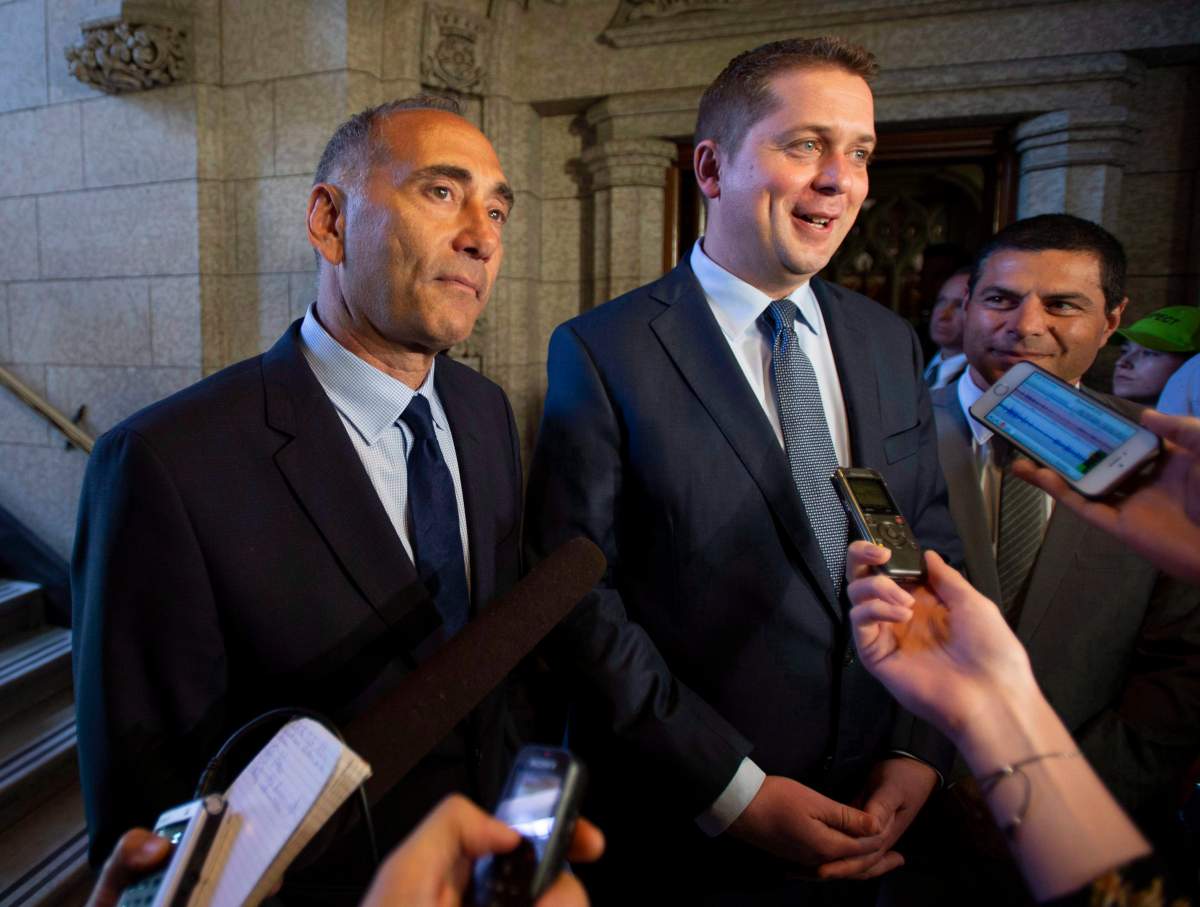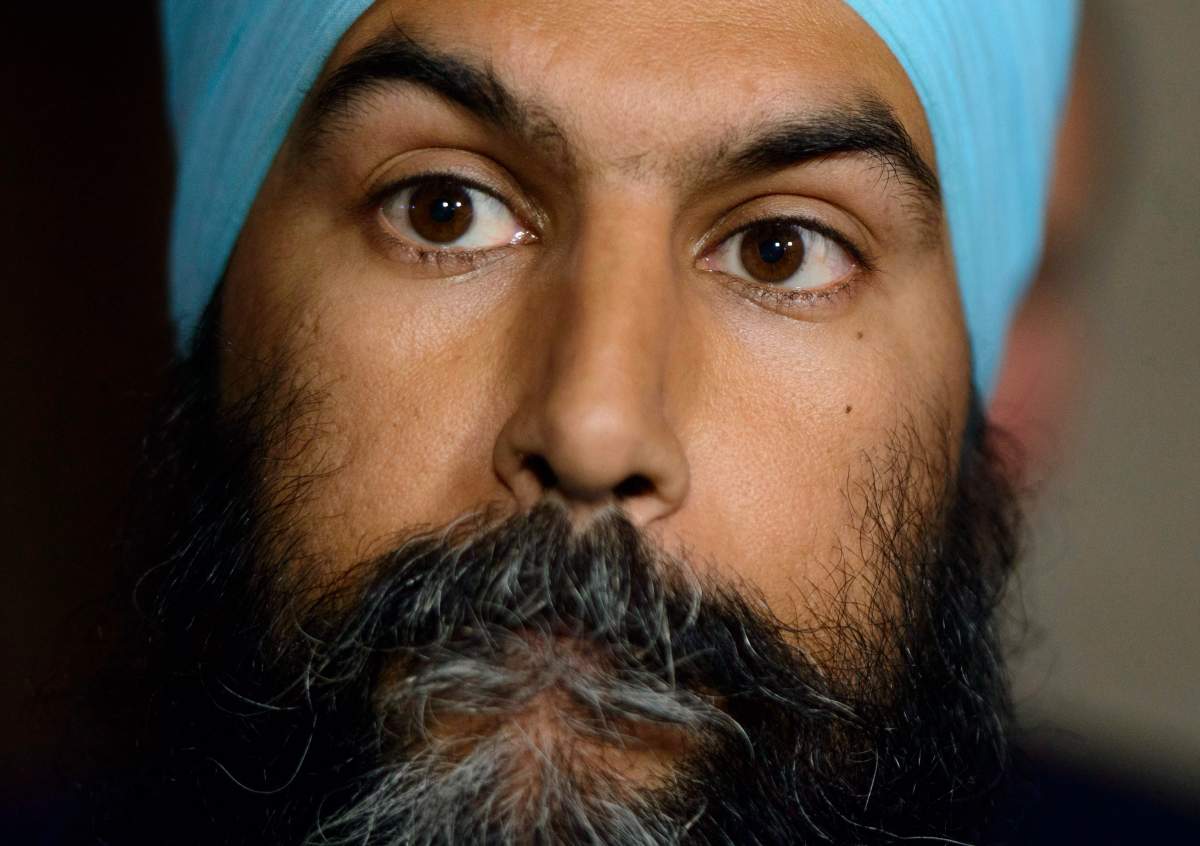Andrew Scheer’s Conservatives are hitting the barbecue circuit this summer as the frontrunners over Justin Trudeau’s Liberals, while Jagmeet Singh’s New Democrats are facing a steep climb to be competitive as all parties prepare themselves for the 2019 federal election campaign.

Scheer’s Conservatives were the preferred choice of 37 per cent of decided and leaning voters that Ipsos polled at the end of June, while Trudeau’s Liberals had the support of 33 per cent and Singh’s NDP were the pick of 21 per cent.
The online poll of 1,002 eligible voters, provided exclusively to Global News, was conducted from June 27 to June 29.
And yet, Trudeau’s approval rating continues to improve.
It’s a climb that Ipsos attributes to two factors: the fulfillment of one of the Liberals’ highest-profile campaign promises, the commitment to legalize recreational use of cannabis; and the Trudeau government’s decision to match the Trump administration dollar-for-dollar in a trade war.
Ipsos found that 55 per cent of those surveyed approved of the job the prime minister is doing, an improvement of five points compared to a similar poll two weeks ago.
And while so-called “horse race” polls taken in the middle of the summer, 18 months ahead of an actual election are sometimes dismissed by observers, this Ipsos poll and others sure to come out over the next few months take on a new importance as each party begins in earnest this summer looking for strong candidates for the 2019 election.
Volunteers and donors may also look to polling numbers at this point in the election cycle as encouragement to support their preferred party.
A prospective Conservative candidate, for example, may be heartened by Scheer’s decent showing in the polls along with the recent upset by-election victory in Chicoutimi-Le Fjord and, based on those factors, may make the significant personal commitment required to become a candidate for the 2019 election.
On the flip side, the dismal showing by the New Democrats in Chicoutimi-Le Fjord — and the dozen or so other by-elections since Trudeau took office in 2015 — combined with continuing low polling numbers will make it more difficult for Singh to recruit strong candidates, volunteers and donors.
Trudeau’s Liberals kicked off their candidate recruitment and nomination season at the end of June when Trudeau attended the nomination meeting of cabinet minister Navdeep Bains in his riding of Mississauga—Malton.

Get breaking National news
Bains is widely seen as the key political minister for the federal Liberals for the Greater Toronto Area.
One potential bright spot in Ipsos’ most recent polling for Trudeau’s Liberals is a possible rebound in Ontario following the decimation of the Ontario Liberals in that province’s recent general election.
Kathleen Wynne’s Liberals entered that campaign with 55 seats at Queen’s Park and lost 48 of them. With just seven seats in the legislature, the Ontario Liberals no longer have official party status and are the third party in the legislature.
Doug Ford’s Progressive Conservatives won a majority of the seats in the election and Andrea Horwath’s NDP finished second.
Federal Liberals have long acknowledged privately that Wynne’s tremendous unpopularity was a drag on the popularity of the Trudeau Liberals in Ontario.
Indeed, two weeks ago, Ipsos found that the Trudeau Liberals were down by 11 points among Ontario voters to the federal Conservatives.
But with Wynne gone and Ford in power, Ipsos has found that the Conservative lead in Ontario has all but vanished with the Conservatives at 35 per cent in Ontario to the Liberals at 33 per cent.
The federal NDP has the support of 26 per cent of Ontario voters.
Ipsos claimed the results of its most recent survey are accurate to within 3.5 percentage points, 19 times out of 20, for the national number.
The pollster’s regional results will be less accurate because they’re taken from a smaller sample, though the pollster did not provide an estimation of their accuracy.
For the most recent survey, Ipsos was able to reach 326 decided and leaning voters in Ontario.
Ipsos also asked survey respondents to rate the Trudeau government on a dozen or so key issues.
The government’s best ranking was on the issue of improving Canada’s relationship with Indigenous communities, with 30 per cent saying it had improved that relationship, versus 55 per cent who think it has stayed the same and 15 per cent who say it has worsened.
The Trudeau government’s worst ranking on issues that Ipsos presented to survey respondents was on immigration, with 47 per cent of respondents saying the federal government has made Canada’s immigration system worse while just 17 per cent say it has improved.
As for “affordability of your day-to-day life,” 46 per cent of respondents said the Trudeau government has made things worse compared to nine per cent who said it has improved.
Trudeau and other Liberals have long touted the Canada Child Benefit as an improvement to the bottom line of most Canadian households while the Conservatives have been relentless in arguing that the prime minister’s approach to putting a price on carbon has increased costs for households.
The poll result on that issue suggests the Conservatives are prevailing in that public relations battle.
Exclusive Global News Ipsos polls are protected by copyright. The information and/or data may only be rebroadcast or republished with full and proper credit and attribution to “Global News Ipsos.” This poll was conducted between June 27 and June 29, 2018, with a sample of 1,002 Canadians from Ipsos’ online panel. The precision of Ipsos online polls is measured using a credibility interval. This poll is accurate to within +/ – 3.5 percentage points, 19 times out of 20, had all Canadian adults been polled.










Comments
Want to discuss? Please read our Commenting Policy first.